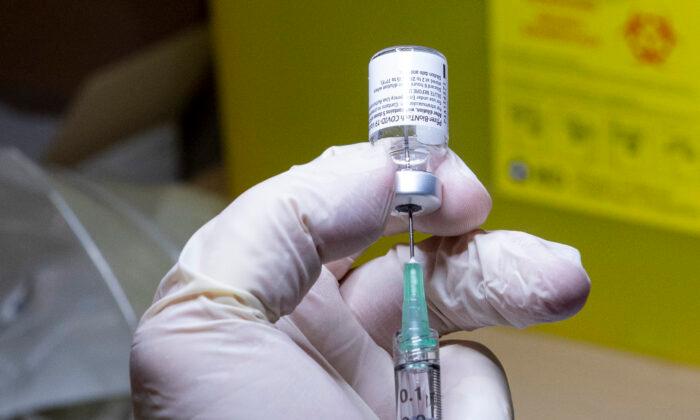In documents tabled in the House of Commons on Jan. 30, Health Canada responded to COVID-19 vaccination questions submitted by Conservative MP Collin Carrie on issues such as adverse events, the “gene therapy” nature of the mRNA shots, and lingering spike protein.
Carrie asked a broad range of technical questions, such as whether the Pfizer clinical trials had tested for “biomarkers (e.g. troponin-1 as an indicator for heart damage, C-reactive protein for inflammation) associated with possible vaccine adverse effects related to spike protein in the blood circulation.”
These tests can help determine if an individual is suffering from heart inflammation, such as myocarditis.
Health Canada said that blood samples have been collected during the Pfizer clinical trials and tested for C-reactive protein, but that Pfizer is currently conducting testing for troponin-1.
“No cases of myocarditis following administration of the vaccine were reported in clinical trials,” said Health Canada in the Inquiry of Ministry signed by Liberal MP Adam van Koeverdeen, the parliamentary secretary to the minister of health.
It added that “very rare cases” of vaccination-induced heart inflammation have been reported since the roll-out of the COVID-19 vaccines.
“Evidence is evolving and investigations into the association between myocarditis and/or pericarditis and mRNA vaccines continue.”
“Based on new evidence, and in order to further minimize the rare risk of adolescents and young adults experiencing myocarditis and/or pericarditis after receiving a COVID-19 mRNA vaccine, NACI now recommends ... Pfizer-BioNTech ... is preferred in adolescents and young adults 12 to 29 years of age,” it said.
Spike ‘Does Not Persist’
MP Carrie also raised questions about the mRNA technology used in some of the vaccines and the process to grant them market authorization.Was Health Canada “aware that the World Health Organization’s internationally accepted guidelines for vaccine evaluation, published in 2005 and 2014, are only applicable to traditional vaccines that contain immunogenic substances and adjuvants,” he asked.
The department replied that it was aware, but that “Regulatory bodies worked collaboratively internationally on developing and agreeing to standards that would be applicable to COVID-19 vaccines developed using various platforms, including those based on mRNA technology.”
Health Canada said the use of mRNA vaccines against viruses and cancers has been studied for over 15 years.
It added that the SARS-CoV-2 spike proteins generated by the mRNA injections do not linger in the body.
“Studies have shown that intravenous and intramuscular injection of mRNA-encoded spike protein is only expressed transiently and at the injection site and the liver, then declines over time,” wrote Health Canada.
“Vaccine produced spike protein is rapidly broken down and does not persist in the body.”
Scientific studies suggest that the mRNA and spike protein generated can remain in the body for extended periods.
“To our knowledge, our study is the first to detect Pfizer-BioNTech and Moderna COVID-19 mRNA vaccine sequences in blood after vaccination, and therefore provides new knowledge regarding the timeframe in which the mRNA can be detected,” wrote the scientists from Denmark.
“Immunohistochemical staining for spike antigen in mRNA-vaccinated patient LNs [lymph nodes] varied between individuals but showed abundant spike protein in GCs [germinal centres] 16 days post-second dose, with spike antigen still present as late as 60 days post-second dose,” says the study, published in the journal Cell.
‘Gene Therapy’
Carrie called the mRNA injections a “gene therapy” in his list of questions.“The mRNA vaccines are not a gene altering therapy,” wrote Health Canada in its response.
“Unlike certain gene therapies that irreversibly alter cell DNA and could act as a source of side effects, mRNA-based medicines are designed to not irreversibly change cell DNA; however, side effects observed in gene therapy could negatively impact the perception of mRNA medicines despite the differences in mechanism.”
Health Canada takes a similar stance in the Inquiry of Ministry.
“Many studies have demonstrated that the mRNA remains in the cytoplasm of cells and does not come in contact with human DNA (which resides in the nucleus),” says the department.
The study authors have pointed out that the study has a number of limitations, including that the cell lines used in the study are different from cells in living organisms, and that further studies into humans need to be performed.
Clinical Trials
Carrie also asked about the results of the Phase 3 clinical trials for the mRNA injections.“The Phase 3 clinical trial for Pfizer COVID-19 vaccine was conducted in the United States, Turkey, Germany, South Africa, Brazil and Argentina,” wrote Health Canada.
The Epoch Times contacted Health Canada to verify whether the trial was indeed completed; the department replied that it isn’t.
“Some cohorts of the phase 3 clinical trial are completed and others are ongoing,” said Health Canada spokeswoman Anne Génier.
“Complexities of clinical trials for COVID-19 vaccines [include] that they are ongoing with the addition of cohorts (new age groups or booster doses) which extends their duration.”
The large-scale vaccination campaign started in late 2020.
Health Canada says that each product “underwent careful scientific review, and met our standards for safety, efficacy and quality.”






Friends Read Free